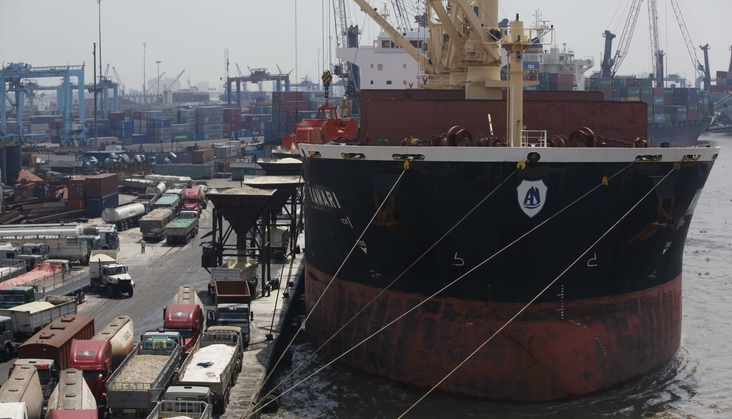New International Maritime Organisation rules will slash the amount of sulphur allowed in maritime fuel.
[This is the second in our series on what to watch in 2020 across the continent. Read the first article, on Africa’s upcoming elections, our third on Africa’s demographics and shortage of capital, and our fourth on the prospects for diamonds and De Beers]
The regulations, which take effect on 1 January, will cut the sulphur cap in maritime fuel from 3.5% to 0.5%. The new limit presents multiple challenges for African businesses in the refining, distribution and sale of compliant very low-sulphur fuel oil (VLSFO).
Costly changes
“The new rules will raise costs for everyone and Africa is no exception,” says Steve Cameron, managing director of Cameron Maritime Resources in London. “The difference is that Africa’s smaller ports mean smaller ships, without the economies of scale.” That means that costs for bunkering – the process of supplying fuel for ships – are significantly higher in Africa than elsewhere, he says.
Cargo ships arriving in Africa need not obtain their bunkers at the ports where they load and discharge. Price has been the driving factor in determining bunkering ports, says Lawrence B. Brennan, a former US Navy captain who is an adjunct professor in international law at Fordham Law School in the US.
Regional competition
African bunker demand is modest, with Egypt, South Africa, West Africa, Mauritius, Algeria, and Mauritania the main markets. Northern and Western African ports face significant competition from Las Palmas in the Canary Islands, Gibraltar and Algeciras in Spain, Brennan says. “These ports offer more competitive prices and better service.”
Investment needed
Increased prices for low-sulphur fuel will translate into higher fuel surcharges per shipping container.
- Hapag-Lloyd has estimated meeting the mandate will equate to $80 to $100 more per twenty-foot equivalent unit (TEU).
- According to the International Energy Agency (IEA) in Paris, the quantity of VLSFO produced globally will initially be limited to 1 million barrels per day, because of reduced availability of low sulphur blending materials.
- “Beyond South Africa, it is improbable that refiners will do much to provide compliant low sulphur bunkers to ships,” Brennan says.
- Africa is a significant importer of gasoline and other fuels used in autos and trucks. So changes in refinery priorities may have an impact on these prices too, Brennan says.
- “An increase in the supply of VLSFO in African markets and investments in infrastructure, particularly tanks and delivery barges, is essential,” he argues. “Quality assurance is of great importance and critical to prevent major engine damage claims against the bunker.”
Cost factors
Still, Cameron notes that land-side logistics costs in Africa are significantly higher than in other parts of the world, and these may have a greater effect on total import costs than more expensive fuel oil.
- Heavy fuel oil refining in Africa is currently limited, Cameron says.
- Countries with refining capacity coming on stream soon, such as Nigeria, where billionaire businessman Akiko Dangote is building a new refinery in the Lekki free zone, may benefit, he argues.
- Brennan says that in the next five years or so, there may be about 500,000-1m barrels per day of new refining capacity coming online in West Africa.
- “These refineries can become the source for a substantial quantity of good quality, low sulphur marine fuels,” he says.
The Bottom Line:
As fuel regulations grow ever more stringent, Africa needs to increase its specialised refining capacity or risk marginalisation in bunkering.
Understand Africa’s tomorrow… today
We believe that Africa is poorly represented, and badly under-estimated. Beyond the vast opportunity manifest in African markets, we highlight people who make a difference; leaders turning the tide, youth driving change, and an indefatigable business community. That is what we believe will change the continent, and that is what we report on. With hard-hitting investigations, innovative analysis and deep dives into countries and sectors, The Africa Report delivers the insight you need.
View subscription options

